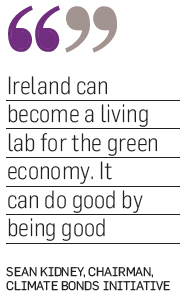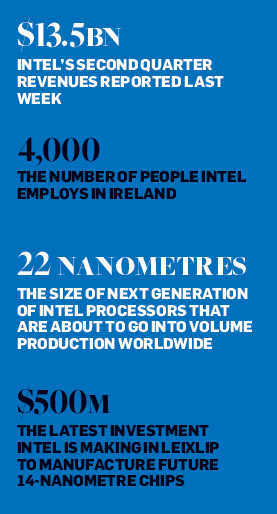Ireland and delivering sustainable growth: Taoiseach Enda Kenny, TD, and Stephen Nolan, executive co-ordinator of the Green IFSC, at the International Sustainability Summit in Galway last week
Ireland can become a global epicentre for the green economy, according to experts who converged in Galway last week for a sustainability summit.
Ireland can become a living lab for the green economy. These were the words of Sean Kidney, chairman, Climate Bonds Initiative, who was speaking at the Enabling, Financing and Delivering Sustainable Growth Summit, held in Galway City last week to coincide with the Volvo Ocean Race.
In all, more than 150 experts in the clean-tech, green financing and sustainability sectors attended the summit to talk about how Ireland can capitalise on the global swerve towards green by harnessing its strengths in the area of wind and ocean energy resources and by leveraging its financial-service expertise towards green investing.
The conference itself was organised by the Green IFSC initiative, a public/private output of the IFSC Clearing House Group at the Department of the Taoiseach.
Kicking off the summit, Stephen Nolan, executive co-ordinator at the Green IFSC, said the aim of the event was to encourage experts in the sustainability space, plus investors, to network and discuss best practices against the backdrop of the world’s energy demand having increased by 25pc over the past decade.
He spoke about how raw materials, food and water all require radical changes in how we embrace technologies.
“The world is moving to a low-carbon model,” said Nolan, referring to how Ireland now manages or services more than US$10bn in green assets.
There’s the Kleinwort Benson Investors Water Fund, which is managed from Ireland, for instance, while last year, funds giant BlackRock teamed up with the renewable energy company NTR to set up a renewable power investment group based out of Dublin.
Financial services and the green economy

At the Galway conference Nolan spoke about how Ireland can tap into the transition to a global green economy by harnessing its financial services expertise.
In recent weeks, for instance, Nolan spoke about how assets serviced by the Irish funds industry passed the €2trn mark.
“We’ve got some of the best natural resources in the world and a world-class IFSC that is celebrating 25 years in existence this year,” said Nolan.
Pointing to how the IFSC is home to more than half of the world’s top 50 banks, he said the aim of the Green IFSC is to help shape legislation around clean tech, as well as help steer tax changes. It is also focused on upskilling existing talent in the IFSC, as well as graduates in the area of green financing.
On the education front, for example, a new MSc in sustainable energy finance is set to begin at Dublin City University this September.
Nolan also pointed out that the aim is to get the message across globally – from Asia to Latin America – about how Ireland can be what he termed a “natural choice for green funds”.
Just this March, the Green IFSC launched the Global Green Asset Management Network on the New York Stock Exchange. The aim of the network is to position Ireland to take a global lead in the US$263bn global green asset management sector.
Taoiseach speaks at the Enabling, Financing and Delivering Sustainable Growth Summit
Opening the event, Taoiseach Enda Kenny, TD, spoke about the need to think collectively about global issues, such as food, water and energy, which are of concern to us all.
“This summit gives us the opportunity to show what we can offer in terms of our green-economy assets,” he said, adding that a low-carbon green economy is going to be “crucial” to Ireland’s future.
Kenny also spoke about how Ireland has the chance to become a global centre of excellence for green finance. However, he said the country will also need to stimulate investment into its own green economy.
From a climate-change perspective, Kidney, who heads up the Climate Change initiative, dived straight into the challenges and opportunities that the world is facing.
Pointing to how global emissions went up by 6pc last year, he referred to the US economist Jeffrey Sachs.
“We are in deep trouble. We have squandered 20 years in the climate debate,” said Kidney.
“We have to decarbonise in a very quick period. This is the IEA (International Energy Agency) saying this,” he explained.
“We are on a path of 6°–7°C global warming. On land you are talking about 10° global warming. We already have 2°C global warming and sea-level rises of two metres,” said Kidney.

To give a tangible example, Kidney said that in Australia, the rail lines have been buckling as a result of temperature increases, and need to be rebuilt. He also pointed to extreme weather events, as well as how the Nile Delta is under “significant” threats as a result of climate change.
Kidney said the IEA still believes it is possible to stop temperatures rising to 6°– 7°C.
He said climate-change action will require a “vast engineering solution”, as well as an investment injection of around $1.3trn each year.
“This is going to dominate the global economy … We need a green-growth policy.”
He also spoke about how countries such as the Republic of Korea have committed some 2pc of annual GDP towards investment in greening its economy. Meanwhile, in 2011, China also devised a five-year plan centring around its clean-energy targets, with clean energy, energy conservation and clean-energy cars being three of its key investment areas.
Capital meets right tech opportunities
From a financing perspective, Kidney said the issue is channelling capital to the right technological opportunities.
“This is about financial engineering,” he said, pointing to how we need to bridge the gap between the money that’s sitting there and linking it up with institutional investors.
Kidney said the world’s biggest investors understand investing in renewables, but that the investment community in general needs to be educated in the area.
He talked about how electric vehicles, water, forests and broadband will all need enabling technologies for the green economy to happen.
“Ireland can become a living lab for the green economy,” he said. “It can do good by being good.”
Ireland’s energy minister on energy policy
Ireland’s Minister for Energy, Communications and Natural Resources Pat Rabbitte, TD, also took to the podium during the sustainability summit.
Rabbitte, who recently launched the Government’s Strategy for Renewable Energy 2012–2020, spoke about how energy policy has a critical role to play in creating the conditions for a return to economic growth across Ireland’s regions.
“Our focus is on creating jobs and creating a low-carbon economy,” he said.
Rabbitte also talked about taking advantage of Ireland’s natural resources and building out the necessary infrastructure.
Pointing to how Ireland generated almost 18pc of its energy from renewable sources last year, he said renewable energy will be integral to shaping Ireland’s future.
“Our island is not simply a resource,” he said. “We’re custodians of a physical environment for future generations.”
Rabbitte also spoke about Ireland’s opportunity to become a renewable electricity exporter of scale.
“Up to now we have focused our renewable electricity to meet our own requirements. Now we can go beyond that,” he said, referring to his meeting with the UK’s Minister of State for the Department of Energy and Climate Change Charles Hendry last month. At the time, the two ministers agreed to develop a formal memorandum of understanding on renewable energy trading between the two countries.
You can also check out other video interviews with speakers and attendees from the sustainability summit. In the following video, Sean Kidney, chairman of the Climate Bonds Initiative, talks about the global imperative to de-carbonise as well as Ireland’s chance to become a living lab for clean energy and export its clean-tech knowledge.